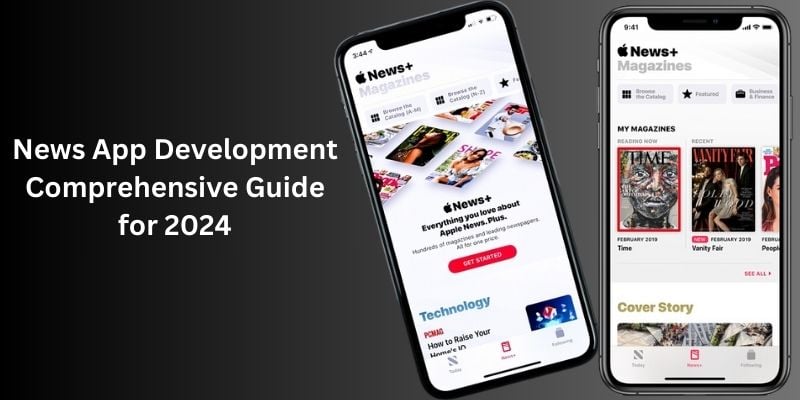Making a comprehensive event management app is challenging, requiring careful thought, planning, and an experienced development team. Yet its popularity will increase steadily through 2024 as more event coordinators face the pressure to coordinate events seamlessly online or offline. For weddings, corporate events, or conferences alike, knowing the steps necessary and the need to incorporate advanced features is vital for its success.
Goal setting for event planning apps is critical. What problems are you trying to address for customers? Features like event scheduling, ticket management, and real-time updates should all be in the picture. Gaining insight into who your customers are and their requirements can help guide app design to deliver maximum value while standing out in the market.
As your next step, you must assemble a team of skilled designers and developers. Partnering with a firm that offers Event Management app development services will give you access to the experience and resources necessary to bring your ideas to fruition, including user interface design, backend development, integration with third-party tools, and integration testing to ensure seamless user experiences.
Integrating advanced technologies like AI, machine learning (ML), and data analytics (DA) into your application will enhance efficiency. AI could offer tailored suggestions for event participants, while data analytics may offer insight into your application's performance and engagement rates.
Steps to Build an Event Management App
A comprehensive guide is provided to help you follow the essential ten steps to developing an app for Event Management.
Define Your Goals and Objectives
Before you dive into the details of application creation, it's essential to clarify the application's purpose and objectives. What issues are you tackling to help event organizers or guests? Are you targeting an area of specialization or a particular type of event, such as corporate meetings or weddings? Recognizing the intended user and their needs will permit you to customize your app's functions and features. The first step is to establish the stage for a more targeted and efficient Event Management app development procedure.
Conduct Market Research
It is crucial to ensure your application is distinctive in a competitive market. Review existing software for managing events to determine its strengths and flaws. Read customer reviews to better understand what customers appreciate and disapprove of. Examine the latest trends in event management and technology to find possibilities for innovation. The results of this research can help you develop a unique benefit offer for your app and aid in developing your Event Management application design procedure.
Create a Feature List
Based on your business goals and market research, you can create a complete list of features your app can offer. The most common features in applications for managing events include planning, ticketing, attendance registration, facility management, and real-time notifications. Think about incorporating features such as the integration of social media, maps with interactive features, and personal recommendations. Please list these features based on their value and practicality, ensuring the event management application creation procedure is practical and effective.
Design User-Friendly UI/UX
Your user interface (UI) and the user experience (UX) style are vital for the success of your application. An attractive UI will ensure that your app looks appealing and user-friendly, and a well-designed UX guarantees that your users enjoy an enjoyable and seamless experience. Concentrate on user-friendly navigation, clean designs, and flexible layouts. Perform usability tests with users to get feedback and make the necessary changes. Investing in an excellent UX/UI design is an essential part of the development of an app for Event Management.
Choose the Right Technology Stack
A good technology stack is essential in the development of a practical and reliable application for managing events. Choose the programming language frameworks, databases, and frameworks most suitable for your application's specifications. For instance, you could select React Native or Flutter for multi-platform development. You could also choose Firebase or MongoDB to provide backend services. A good technology stack will ensure that your application runs efficiently and can handle the needs of event management, which is an essential component of event management app development.
Develop the App
Once you have your feature set along with your style, design, and stack, you can begin developing it. The process typically involves writing the backend and frontend, integrating third-party applications, and establishing databases. In the case of a complex app you are developing, you may require a team of programmers comprising the backend and frontend experts. While developing, you should focus on creating clean and efficient code and ensuring that all of the application's functions work harmoniously. This is the premise of the process of Management application development.
Test Rigorously
Testing is an essential step when developing apps. It ensures that errors and functions do not contaminate your application as you would expect. Test your app in various ways, including functional tests, performance testing, and security tests. Testing your beta version with a small group of users will give valuable insight into your application's performance in actual scenarios. Resolve problems or suggestions quickly to improve your application's performance and user experience. Testing thoroughly is crucial for delivering an app of high quality, which is why it's essential when developing an event management app.
Launch the App
When your app is checked and refined, it's prepared to make it available to the general public. Make a planned launch plan with marketing and promotions to create buzz and attract people to sign up. You might want to initially consider launching a beta version to collect preliminary feedback and make any necessary adjustments before the public release. Ensure that the app you're developing is listed in top app stores, like the Apple App Store or Google Play Store, to be accessible to a broad audience. Launching is the most crucial stage in creating your Event Management app development process and is the first step for the ultimate success of the application.
Monitor and Update
When you launch your app, constant monitoring is vital to monitor its performance and the engagement of users. Utilize analytics tools to collect details about app use, user behavior, and any issues. Updates and regular maintenance are necessary to fix issues and to develop new features as well as improve efficiency overall. Interacting with users via reviews and feedback can give helpful information for future updates. Updates and maintenance are frequently essential to address issues and to create new features as well as increase the efficiency of all features.
Scale and Evolve
When your app becomes more popular, and your number of users increases, think about scaling and enhancing it to meet any new needs and potential. This could mean adding new features, improving efficiency, or expanding your application into new platforms. Expanding and enhancing your app is a plan for the future to ensure its ongoing success and relevance to the ever-changing world of event management.
Steps to Hire Event Management App Developers

Selecting the best event management app developer will make all the difference in realizing your dream. To help you through this crucial procedure, here are essential steps to hire event management app developers:
Define Your Requirements
Before beginning your hiring process, It is crucial to establish an idea of what you require from the event management software. Then, define the key capabilities and functions that are crucial to the app you choose to use.
Do you want real-time scheduling, attendance management, ticketing, or analytics capabilities? A well-planned checklist of your requirements won't help you find the perfect event management app but can also aid in expressing your ideas effectively.
Research and Shortlist Developers
Begin by looking up prospective developers or firms with proven experience developing event management apps. Find portfolios, reviews, and reports that show their skills. Select a few people with experience in similar work and good knowledge of the particular software requirements for managing events.
Evaluate Technical Skills
Developers' technical expertise is essential. Test their abilities in pertinent frameworks, programming languages, and tools necessary for the project you are working on. If you are developing an app to manage events, proficiency with backend technologies such as mobile development and integration with third-party services is essential. A skilled event management app creator must be proficient in these areas so that the app runs seamlessly and effectively.
Assess Industry Experience
Experience gained in event management can give valuable insight and creative solutions. Consider whether the designers you're looking at have had projects in the field. Their experience can prove beneficial in understanding the specifics of event management and in delivering products that meet standard industry requirements.
Review Development Methodology
An understanding of the methodological approach that is used by the developer of the Event Management application creator is essential for a practical project. The most popular methodologies are Agile, Scrum, and Waterfall. Agile and Scrum are usually preferred when developing apps due to their flexibility and iterative nature. Make sure that the methodology developers use aligns with your project's requirements and schedule.
Check for Design Capabilities
Design and user experience are important components of an event-management app. A well-designed app must be user-friendly, attractive, appealing to the eye, and simple to use. Check the designer's capabilities through a review of their past designs. Find examples of projects where they've used efficient interfaces for users and design concepts.
Evaluate Communication and Collaboration
Collaboration and communication are crucial for the development of the project. The Event Management app developer that you choose to work with must be expected to be responsive and willing to receive feedback and be able to give periodic updates regarding the development's progress. Set up clear communication channels and ensure the app developer will work closely with your team members to reach your goals.
Consider Post-Launch Support
The app's development doesn't stop with the release of the application. After launch, support is vital to address any problem, implement needed, makes, and ensure efficiency. Find out about the developer's post-launch services for support and maintenance plans. The most reliable developer of Event Management apps will provide regular support for any issues and ensure the app is up-to-date.
Review Pricing and Budget
Budget is one of the most vital factors when selecting an app developer. Get detailed estimates from the shortlisted candidates and then compare their price structures. Be wary of expensive or low quotes because they could indicate poor high quality or hidden charges. Pick a developer whose pricing matches your budget and offers a transparent description of the costs associated with the work.
Check References and Reviews
Before deciding, read the reviews and references for the Review and the references of the Management app creator you're considering. Get in touch with past customers for feedback about their experiences working with the company. Positive reviews and testimonials guarantee the quality of work, reliability, and ability to follow through on promises.
Best benefits of an Event Management app Development solutions
This looks at the most significant benefits of implementing these innovative solutions.
Streamlined Event Planning
Event management software simplifies the whole planning process by combining various functions onto an integrated platform. These apps combine the most critical aspects of planning an event, from budgeting and scheduling to managing guests and location selection. The streamlining process reduces the work and time needed to plan events and allows event planners to focus on their creative and strategic projects instead of being absorbed in administration details.
Enhanced Communication and Collaboration
Effective communication is the critical ingredient for successful event planning. Apps for managing events facilitate the seamless communication of all parties, such as event planners, participants, and vendors. Features like in-app messaging or notifications, as well as real-time updates, make sure everyone is in the same place. The increased communication aids in solving issues quickly and keeping the process in the right direction.
Improved Attendee Experience
Satisfaction of the attendees is critical to an occasion's overall performance. The apps for managing events have a wide range of features designed to improve the attendees' experience. They include personalized agendas and interactive maps, as well as live updates and immediate feedback. These apps ensure that attendees can access all the information they need right at their fingertips. The convenience and accessibility dramatically enhance the overall user experience.
Efficient Registration and Ticketing
The days of manually registering and ticketing procedures. The Event Management apps streamline the process, allowing guests to sign up and buy internet tickets quickly. Options like online payment gateways, electronic ticketing, and automated confirmations make registration more accessible and minimize the chance of making mistakes. The efficiency of this process not only helps save time but also increases security and eases the burden of administrative tasks.
Data-Driven Insights
Data is an effective instrument for enhancing event management. Events management software collects and reviews data about different aspects of an occasion, such as the demographics of attendees, ticket sales, and engagement levels. Data-driven approaches provide valuable insight that could be utilized to make informed decisions, optimize future events, and show the return on investment (ROI) for all parties involved.
Cost-Effective Solutions
Incorporating event management software will pay off over the long term. By automating routine activities and eliminating the necessity for manual interventions, these apps help reduce operational costs. In addition, the gains achieved through automation and integration reduce the requirement for more employees or other resources, making event management more cost-effective.
Increased Flexibility and Scalability
Apps for managing events are created to handle various dimensions, ranging from intimate gatherings to massive conferences. They can be scaled to allow organizers to alter the application's functions to accommodate the event's particular requirements. Whether you're organizing a local event or an international summit, event software can be customized according to the scope and needs of the gathering.
Real-Time Monitoring and Adjustments
One major advantage of using apps for event management is the ability to track events live. These apps provide live information on different aspects of the event, such as check-ins for attendees, ticket sales, and logistics arrangements. The real-time information allows organizers to take immediate action when needed, ensuring that the event goes smoothly.
Enhanced Marketing and Promotion
The ability to effectively promote an event is vital to entice attendees and ensure its success. The majority of event management software comes with integrated marketing tools that permit organizers to advertise their events in various ways. Tools like email marketing, social media integration, and targeted marketing aid in reaching out to a larger crowd and increasing interest in the occasion.
Environmental Sustainability
In today's environmentally conscious society, reducing events' carbon footprint is essential. Events management software contributes to sustainability by reducing the requirement for paper-based material. Electronic tickets, invitations, and online agendas reduce paper use, making an event eco-friendly. A commitment to sustainability will help improve an event's reputation and draw eco-conscious participants.
Conclusion
Making an event management application by 2024 will require a thorough knowledge of current technology and an eye for the user experience. This requires careful plan-making, from analyzing the market's needs and setting clearly defined goals to choosing the best technology stack and incorporating critical tools like event creation and ticketing, real-time updates, and friendly user interfaces. Scalability, security, and seamless integration of other applications are vital for ensuring reliable and flexible software.
Engaging professionals to provide event management app development solutions will significantly improve the functionality and quality of your application. Experts can give essential insights, employ the latest technologies, and ensure your application meets industry standards. Assist in troubleshooting, offering continuous help, and updating your app per changing customer feedback and market trends.
Additionally, it's important to place the user central to the development process. Conducting a thorough market study, gathering feedback from users, and continually adjusting in response to that feedback will make for better and better-known software. In the industry of event planning changes, being flexible and creative is crucial for maintaining an edge.












Share this blog